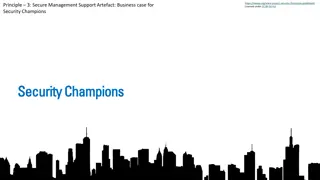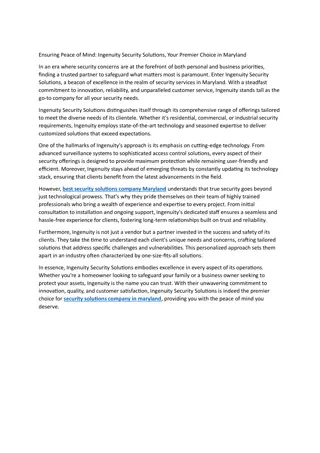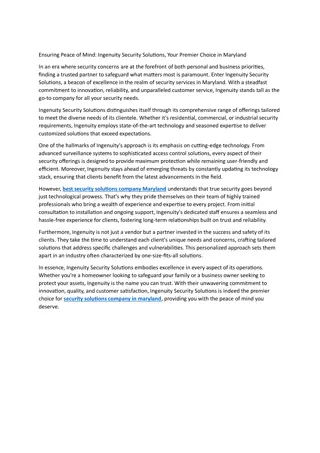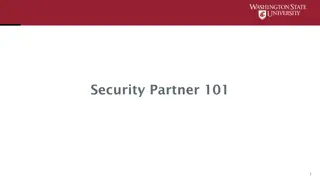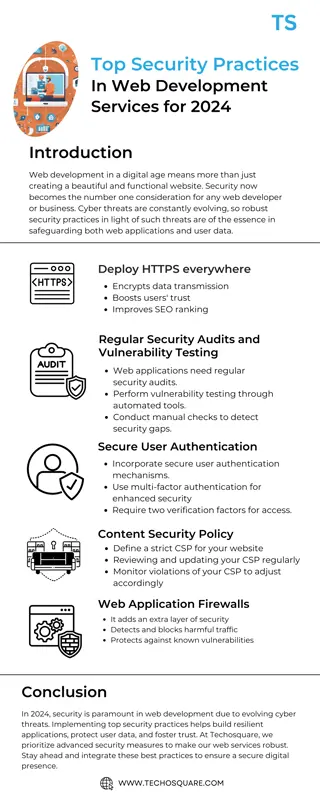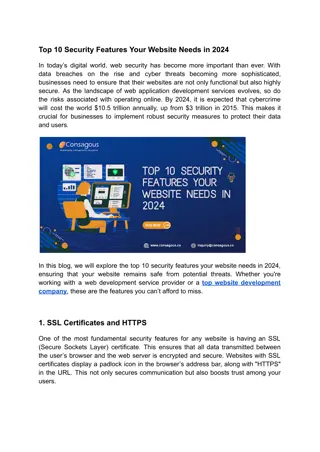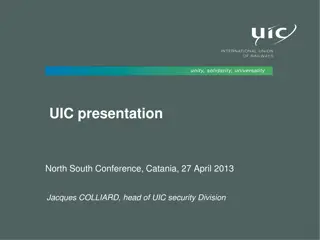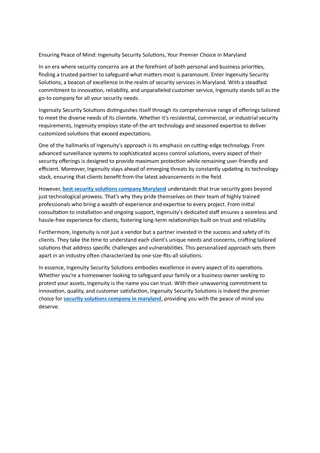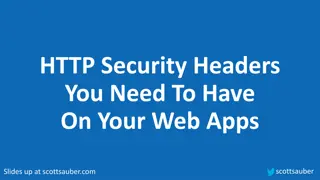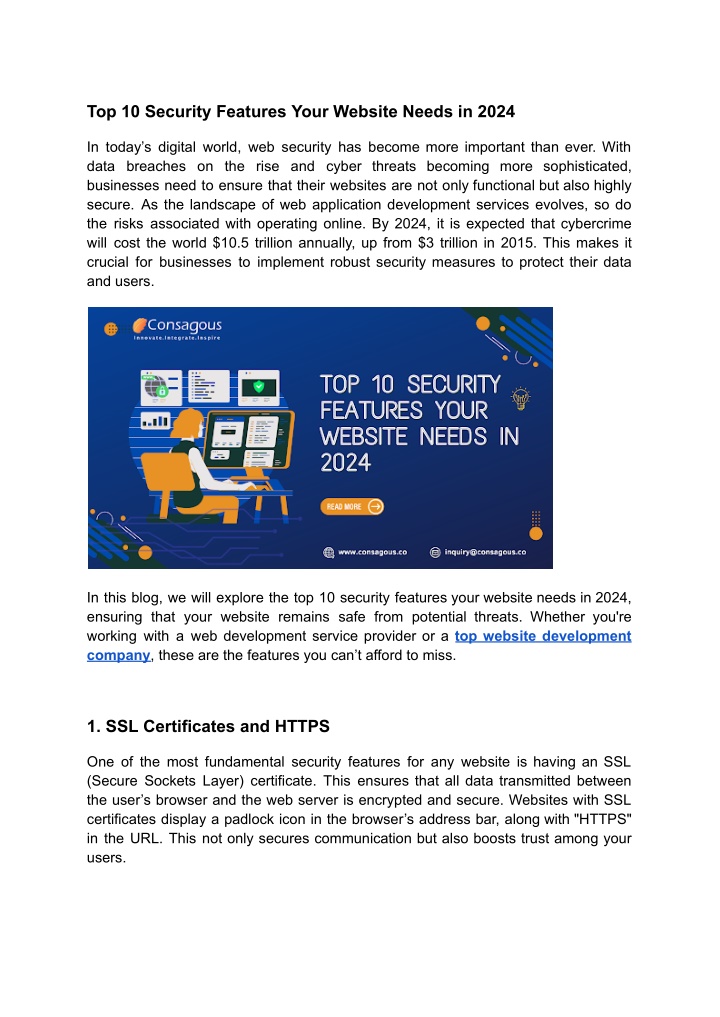
Top 10 Security Features Your Website Needs in 2024
By implementing these top 10 security features, you can ensure that your website is prepared to face the challenges of 2024. Whether you need SSL certificates, firewall protection, or DDoS mitigation, it's essential to work with a trusted web develop
Download Presentation

Please find below an Image/Link to download the presentation.
The content on the website is provided AS IS for your information and personal use only. It may not be sold, licensed, or shared on other websites without obtaining consent from the author. If you encounter any issues during the download, it is possible that the publisher has removed the file from their server.
You are allowed to download the files provided on this website for personal or commercial use, subject to the condition that they are used lawfully. All files are the property of their respective owners.
The content on the website is provided AS IS for your information and personal use only. It may not be sold, licensed, or shared on other websites without obtaining consent from the author.
E N D
Presentation Transcript
Top 10 Security Features Your Website Needs in 2024 In today s digital world, web security has become more important than ever. With data breaches on the rise and cyber threats becoming more sophisticated, businesses need to ensure that their websites are not only functional but also highly secure. As the landscape of web application development services evolves, so do the risks associated with operating online. By 2024, it is expected that cybercrime will cost the world $10.5 trillion annually, up from $3 trillion in 2015. This makes it crucial for businesses to implement robust security measures to protect their data and users. In this blog, we will explore the top 10 security features your website needs in 2024, ensuring that your website remains safe from potential threats. Whether you're working with a web development service provider or a top website development company, these are the features you can t afford to miss. 1. SSL Certificates and HTTPS One of the most fundamental security features for any website is having an SSL (Secure Sockets Layer) certificate. This ensures that all data transmitted between the user s browser and the web server is encrypted and secure. Websites with SSL certificates display a padlock icon in the browser s address bar, along with "HTTPS" in the URL. This not only secures communication but also boosts trust among your users.
In 2024, it's estimated that websites without HTTPS will be viewed as unsafe by more than 70% of users, affecting traffic and SEO rankings. Any web development service you choose should ensure this feature is included by default. As more organizations migrate their operations to cloud-based platforms, the intersection of cloud security with traditional SSL and HTTPS safeguards becomes increasingly crucial. Cloud security plays a major role in enhancing these measures, offering an additional layer of protection specifically tailored for cloud environments. This integration is vital for preventing unauthorised access and ensuring that data remains secure both in transit and at rest. To dive deeper into how cloud security is transforming the traditional paradigms of website protection, particularly through enhanced SSL and HTTPS protocols, explore our detailed blog on the subject. Discover the critical role of cloud security in IT, and learn how it fortifies the encryption and security measures critical to modern web applications. 2. Two-Factor Authentication (2FA) Two-factor Authentication is an additional layer of security where users must provide two pieces of evidence to log into their accounts: something they know (like a password) and something they have (like a mobile phone or security token). As hackers become more adept at bypassing traditional login methods, 2FA can significantly reduce the risk of unauthorised access. For businesses seeking comprehensive web application development services, integrating 2FA into user authentication processes is a smart move, particularly for websites handling sensitive information such as e-commerce platforms. 3. Regular Security Audits A security audit is a comprehensive review of your website s security measures, ensuring that potential vulnerabilities are identified and patched before they can be exploited. Regular audits can identify outdated software, insecure configurations, or overlooked security loopholes. Top website development companies recommend conducting security audits at least once every six months. A study by IBM found that businesses that regularly audit and update their security practices can reduce breach costs by 38%. 4. Firewall Protection
A firewall acts as the first line of defence against potential cyber-attacks by monitoring and controlling incoming predetermined security rules. Whether it's a hardware firewall or a web application firewall (WAF), both can protect your website from attacks like SQL injection and cross-site scripting. and outgoing web traffic based on Leading web development companies now integrate WAFs into websites as a standard security measure, providing 24/7 protection against common threats. 5. Data Encryption Encryption ensures that even if data is intercepted during transmission, it cannot be read or tampered with. This feature is especially crucial for websites handling sensitive information like credit card numbers, passwords, and personal data. As of 2023, only 33% of small businesses use encryption, leaving many vulnerable to breaches. In 2024, it's predicted that encryption will be one of the top priorities for companies investing in web development services. For businesses that handle online payments, adhering to the Payment Card Industry Data Security Standard (PCI-DSS) is highly recommended. Implementing a PCI-DSS-compliant application is critical to ensure that all transactions are secure and meet the industry standards for payment security. 6. Automatic Backups Even with top-notch security measures in place, it s essential to prepare for worst-case scenarios, such as data breaches or system failures. Automatic backups ensure that your website s data is regularly saved and can be restored in case of a cyberattack, ensuring minimal downtime. Many web application development services now offer automatic backups as a standard feature, with tools like Acronis and CodeGuard providing affordable and effective backup solutions. 7. Content Security Policy (CSP) A Content Security Policy is a security feature that helps prevent cross-site scripting (XSS) attacks by specifying which sources of content are considered safe for your
website. By restricting the resources that a web page can load (e.g., scripts, styles), CSP can protect your website from malicious attacks. Top website development companies emphasise the importance of CSP, especially for websites that handle user-generated content or rely on third-party scripts. 8. Captcha and Bot Protection Automated bots can cause significant harm to websites by executing malicious scripts, engaging in brute-force login attempts, or spamming forms. Implementing CAPTCHA systems (Completely Automated Public Turing test to tell Computers and Humans Apart) is an effective way to differentiate between human users and bots. A report by Imperva found that 27.7% of all website traffic in 2023 came from bad bots, and that number is expected to rise in 2024. Web development service providers often recommend tools like reCAPTCHA to protect websites from bot attacks. 9. Regular Software Updates and Patching Using outdated software or plugins is one of the most common vulnerabilities exploited by hackers. Ensuring that your website s software is regularly updated and patched can protect against known security holes. One study found that 44% of data breaches could have been prevented if website owners had simply kept their software up-to-date. Any web development company that values security should offer regular updates and patching as part of their maintenance services. 10. DDoS Protection Distributed Denial of Service (DDoS) attacks can overwhelm your website with traffic, causing it to slow down or crash entirely. As businesses increasingly rely on their online presence, DDoS attacks can result in significant financial losses. In 2024, DDoS attacks are expected to increase by 15%, making it vital for businesses to implement protection measures. Companies specializing in web application development services should integrate DDoS mitigation tools like Cloudflare and Akamai into their offerings to ensure websites remain operational under attack.
Tools to Strengthen Website Security 1. Sucuri A website security tool that offers malware scanning, firewall protection, and performance monitoring. 2. Cloudflare Provides DDoS protection, SSL certificates, and secure DNS services to improve website security. 3. LastPass A password management tool that stores and encrypts login credentials, minimizing the risk of password-related breaches. 4. Acronis An automatic backup and disaster recovery tool that ensures your website data is safe and recoverable. 5. WPScan A WordPress security scanner that identifies vulnerabilities in themes, plugins, and core files. The Future of Web Security: 2024 and Beyond As we move into 2024, cyber threats will only become more sophisticated. To stay ahead, businesses need to invest in not only the development but also the ongoing security of their websites. By partnering with a top website development company, you can ensure that your site is equipped with the latest security features, safeguarding your data, users, and reputation. If you re looking to upgrade your website s security or need assistance with web development, Consagous Technologies is here to help. As one of the leading web development companies offering comprehensive web application development services, we specialize in creating secure, scalable, and efficient websites. Visit our web application development services page to learn more about how we can help. Conclusion: Invest in Your Website s Security Today By implementing these top 10 security features, you can ensure that your website is prepared to face the challenges of 2024. Whether you need SSL certificates, firewall protection, or DDoS mitigation, it's essential to work with a trusted web development service that prioritizes security. Don t wait for a cyberattack to test your website's security. Contact Consagous Technologies today for tailored web development services. security solutions and professional
Secure your website and protect your business with Consagous Technologies cutting-edge web application development services. Visit our website today and get started on building a secure, scalable web presence. Drop mail at inquiry@consagous.co or call us +1 (213) 257-8054 Original Source: https://bit.ly/3XvsG6W







